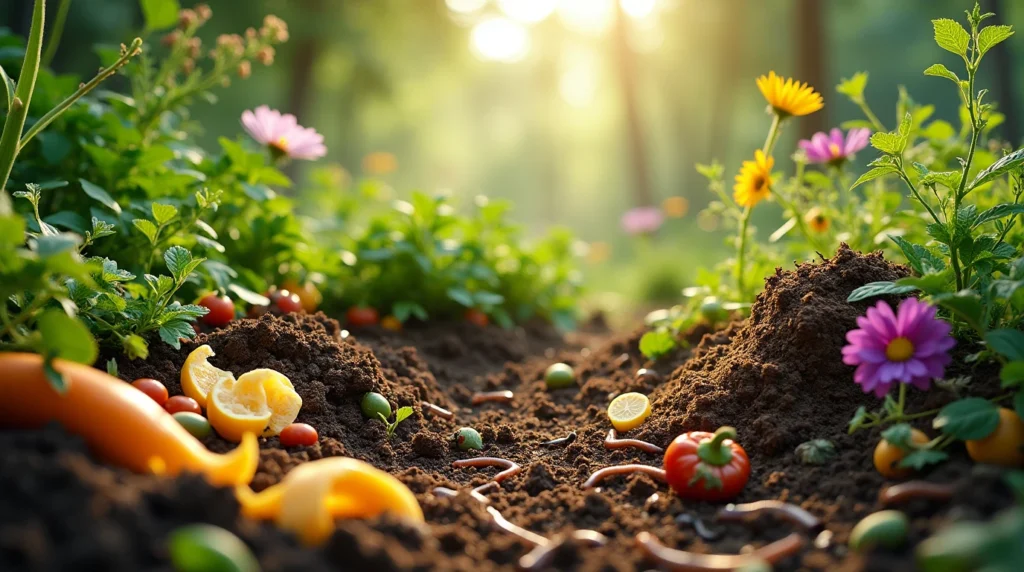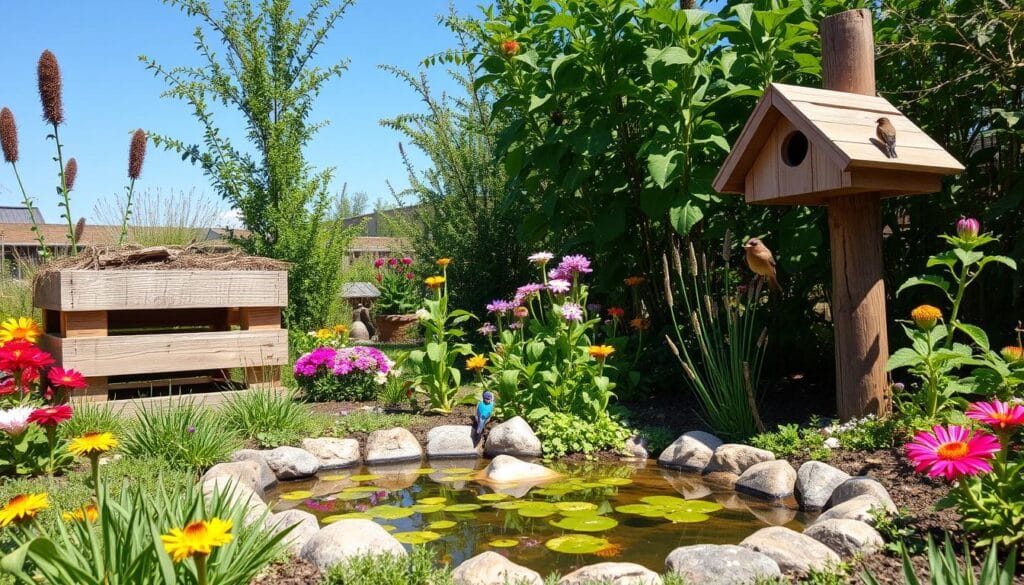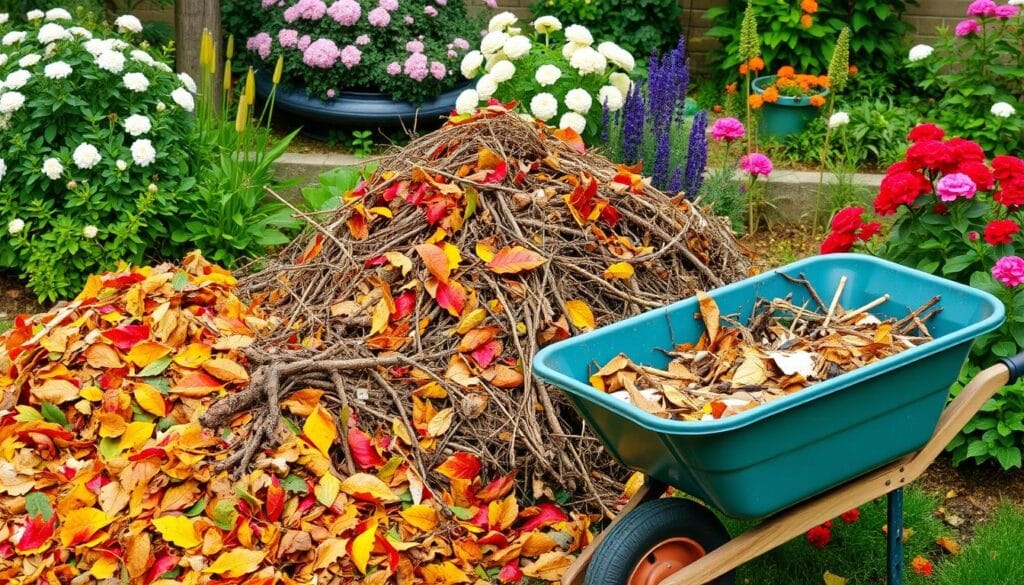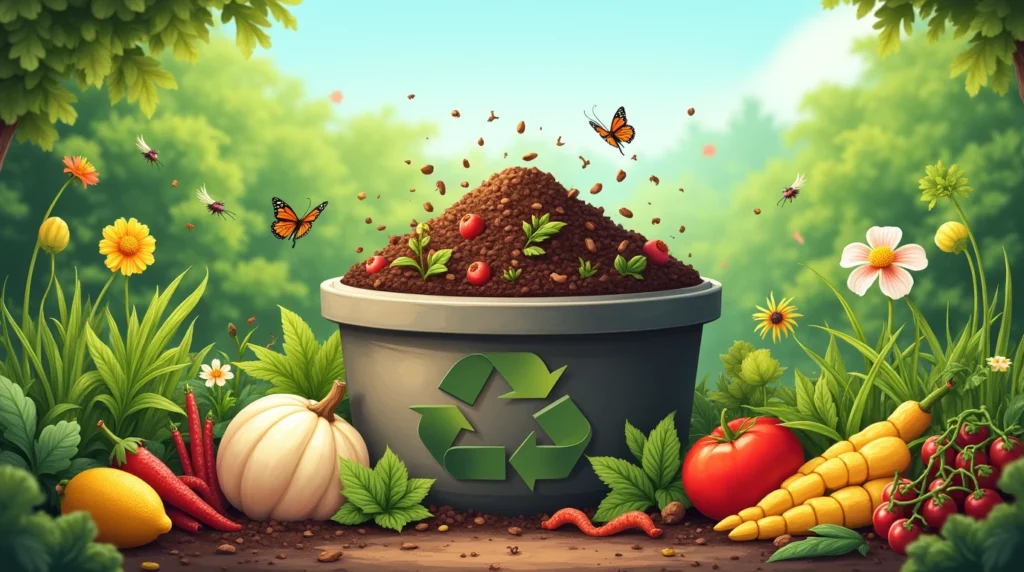When you garden, you create a lot of waste like pruning debris and leaves. Instead of throwing it away, you can recycle it. This makes your garden more eco-friendly and starts with using waste in new ways. It helps your garden grow better and is good for the planet.
By recycling garden waste, you make your garden a symbol of sustainability. You can compost, mulch, or even upcycle. Exploring these options helps you make your garden beautiful and eco-friendly. Recycling garden waste is key to a greener future, starting with how you handle your garden’s waste.
Key Takeaways
- Repurposing garden waste reduces the amount of waste sent to landfills and creates a more sustainable garden.
- Garden waste recycling involves creative methods like composting, mulching, and upcycling.
- Eco-friendly garden waste practices benefit the environment and your plants.
- Adopting garden waste recycling methods can reduce your ecological footprint.
- Community involvement in garden waste recycling can collectively impact waste reduction.
- Garden waste disposal choices are crucial in creating a sustainable garden ecosystem.
- Embracing garden waste recycling contributes to a more sustainable future.
Understanding Garden Waste Recycling
Garden waste recycling is key to sustainable waste management. It turns organic waste like leaves and branches into compost and mulch. This way, you cut down on landfill waste and greenhouse gases.
The University of Maryland says grasscycling can cut mowing time by 38%. It also adds nutrients to the soil, reducing the need for fertilizer by 25 to 50%. This shows how important it is to manage waste well.
- Reducing greenhouse gas emissions by up to 35%
- Conserving natural resources by reusing organic waste
- Creating valuable products like compost and mulch
Recycling organic waste helps the environment and lowers your carbon footprint. The Veransa Group says using materials to improve soil health is vital for a green future.
| Benefits | Environmental Impact |
|---|---|
| Reduced greenhouse gas emissions | Up to 35% reduction |
| Conserved natural resources | Reduced landfill usage |
| Creation of valuable products | Compost and mulch for soil health |
Composting: Transforming Waste into Treasure
Composting turns yard waste into something valuable for your garden. By using composting services, you can cut down on yard waste and make soil better. This is a green way to recycle and help the planet.
What Can Be Composted?
You can compost many things like food scraps, leaves, grass clippings, and branches. It’s important to mix “green” stuff like food and grass with “brown” stuff like leaves and branches. This makes a good compost pile.
How to Start Your Compost Bin
To start your compost bin, mix green and brown materials. Add water to keep it moist and turn it often. This helps it decompose well. Composting services can help guide you through this.
Maintaining Your Compost
To keep your compost going, turn it on regularly and check its temperature and moisture. By doing these things and using green recycling, you’ll get a compost that’s good for your garden. It also helps reduce yard waste.
| Material | Category |
|---|---|
| Food scraps | Green |
| Leaves | Brown |
| Grass clippings | Green |
| Branches | Brown |
Mulching: A Smart Solution for Garden Health
Mulching is key for a healthy garden. It helps in recycling garden waste and keeping the garden eco-friendly. It also helps in decomposing organic materials naturally.
There are many mulching options, like wood chips and rubber. Organic mulches like wood chips and bark improve soil health. Inorganic mulches, like rubber, last longer and look good.
For most plants, a 2-3-inch layer of mulch is best. Watering after applying mulch helps it settle.
Some benefits of mulching include:
- Weed suppression
- Moisture conservation
- Soil health improvement
- Soil temperature regulation
- Attraction of beneficial insects and fungi
Mulching makes your garden sustainable and eco-friendly. It helps in reducing waste. Regularly check and update your mulch to keep it effective.
Mulching is crucial for a balanced garden ecosystem. It helps in reducing waste and keeping your garden healthy. This way, you can enjoy a beautiful garden while helping the environment.
| Mulch Type | Benefits | Drawbacks |
|---|---|---|
| Organic Mulch | Improves soil fertility, suppresses weeds | May not improve soil fertility, and can be expensive |
| Inorganic Mulch | Long-lasting, decorative | May not improve soil fertility, can be expensive |
Creating Natural Fertilizers
Exploring organic waste recycling and green waste recycling shows the value of composting. It helps make natural fertilizers for your garden. You can use kitchen scraps and other organic materials to feed your garden without chemical fertilizers.
Alfalfa pellets can be added to soil at a rate of ¼ c. per square foot. Banana peels add nitrogen, phosphorus, potassium, and calcium. Eggshells ground into powder and dried tea leaves mixed into soil help plants grow bigger and the soil richer.
Here are more natural fertilizers to try:
- Dried fruit peels can be added in powder form directly into the soil
- Coffee grounds can suppress plant growth, so use them sparingly
- Food scraps and yard waste can be composted to reduce waste and create nutrient-rich soil
Remember to balance your compost with the right ratio of browns to greens. Keep the temperature right for worm activity. With these tips and a bit of creativity, you can make your natural fertilizers. This will give your garden the nourishment it needs.

| Material | Benefits |
|---|---|
| Alfalfa pellets | Adds nitrogen, phosphorus, and potassium to soil |
| Banana peels | Rich in nitrogen, phosphorus, potassium, and calcium |
| Eggshells | Provides calcium and promotes healthy soil structure |
DIY Projects for Garden Waste
Looking for ways to lessen your environmental impact? Try creative DIY projects with garden waste. Turning eco-friendly garden waste into useful items is a great idea. You can build structures like trellises or pergolas using branches. This not only adds beauty to your garden but also saves on materials.
Using leaves and grass clippings for mulch is another smart move. It helps control soil temperature and moisture. This is a perfect example of green recycling in action. By doing this, you cut down on waste and make your garden more sustainable. The EPA says food scraps and yard waste account for over 28 percent of what we throw away, so repurposing them is key.
Here are some more creative uses for garden waste:
- Composting kitchen scraps and yard waste to create nutrient-rich soil
- Using grass clippings as a natural fertilizer can reduce the need for store-bought nitrogen fertilizer by 25 to 50 percent.
- Creating a bug hotel or insect house using recycled materials and garden waste
By adopting these eco-friendly garden waste management practices, you can lessen your environmental impact. Always wear protective gear when handling garden waste. For more ideas and tips, talk to local gardening experts or check out online resources.
| Material | Usage | Benefits |
|---|---|---|
| Leaves | Mulch, compost | Regulates temperature and moisture, enriches soil |
| Grass clippings | Natural fertilizer, mulch | Reduces the need for store-bought fertilizer, regulates temperature and moisture. |
| Branches | Structures, crafts | Adds visual interest, reduces waste output |
Wildlife Habitat Enhancement
Exploring ways to improve your garden’s ecosystem is key. Sustainable waste management and organic recycling are crucial. They help create a welcoming space for local wildlife. Yard waste can become compost or mulch, aiding native plants and trees.
Native plants need less water and care than others. This reduces the need for water, fertilizers, and pesticides. It’s good for the environment and supports local biodiversity. Using water-efficient irrigation and organic mulch helps keep the soil moist and healthy.

To make your garden even better, think about creating a wildlife-friendly habitat. You can do this by:
- Providing food, like native plants and flowers
- Offering shelter, like brush piles or deadfall
- Creating water sources, such as ponds or bird baths
These sustainable practices help conserve local wildlife and improve your garden’s health. Remember to recycle organic waste and remove yard waste to reduce your environmental impact. This will help create a thriving habitat for local species.
Starting this journey means understanding the importance of sustainable waste management. By making smart choices, you can help keep nature in balance. This supports the well-being of local wildlife.
Transforming Garden Waste into Art
Exploring garden waste recycling can be eye-opening. You’ll see that eco-friendly garden waste can turn into amazing art. From sculptures to decorations, the options are vast. Upcycling in garden design is gaining popularity. It lets you make unique, useful pieces that also cut down on waste and add character to your garden.
Artists are now making art from garden waste. Yassir Omari, for instance, uses wood, metal, and fabric for his sculptures. His work includes a wooden stick Amman sculpture and an eight-meter grasshopper from Toyota scraps. Hannah Tizedes also makes a statement with her art, using over 100,000 tiny, colorful plastic pieces to show plastic waste’s impact.
Some standout examples of garden waste art include:
- Camel sculptures made from old bicycle parts
- Grasshopper sculptures made from Toyota vehicle scraps
- Art installations created from plastic waste collected from the Great Lakes
These projects show the beauty and impact of recycling garden waste. By doing this, you help make your garden more sustainable and eco-friendly.
When you think about turning your garden waste into art, remember every effort matters. Join local cleanups, cut down on plastic, and support artists who use garden waste. This way, you can positively affect the environment. So, why not be creative and make your garden waste into something beautiful?
| Artist | Medium | Notable Works |
|---|---|---|
| Yassir Omari | Wood, metal, fabric | Wooden stick sculpture of Amman, eight-meter grasshopper made from Toyota vehicle scraps |
| Hannah Tizedes | Plastic waste | Art installations created from plastic waste collected from the Great Lakes |
Seasonal Clean-Up Strategies
As the seasons change, it’s key to know how to handle yard waste. The right timing and methods can greatly help your garden stay healthy. In fall, removing leaves and debris is crucial to protect your lawn and plants. Using composting services can turn your waste into valuable soil.
In spring, refresh your garden by removing dead plants and pruning trees. This is a great time to use mulching to keep moisture in and weeds out. Many places offer yard waste collection in the spring, making it easy to dispose of waste properly.
Timing Your Garden Waste Disposal
- Remove leaves and debris in the fall to prevent damage to your lawn and plants.
- Prune trees and shrubs in the spring to promote healthy growth
- Consider using professional waste removal services to save time and effort
Best Practices for Fall Clean-Up
Autumn yard prep includes using a mulching mower to break down leaves. This method reduces landfill waste and enriches your soil. By using yard waste removal and composting, your garden stays healthy all year.

Spring Refresh: What to Keep
In spring, decide what to keep and what to remove in your garden. Keep healthy plants and trees, and remove the rest. This balances your garden’s ecosystem and encourages growth. By following these clean-up tips and using green recycling, your garden will flourish.
| Season | Task | Benefit |
|---|---|---|
| Fall | Remove leaves and debris | Prevents damage to lawn and plants |
| Spring | Prune trees and shrubs | Promotes healthy growth |
| Year-round | Use composting services | Creates nutrient-rich soil amendments |
Community Involvement in Recycling
When looking at ways to handle garden waste, think about joining your community in recycling. Getting involved in local composting programs helps make waste management better. It reduces landfill waste and encourages green gardening practices.
There are many ways to get involved, like organizing community gardening days. Neighbors can share tips and resources. This teamwork boosts recycling rates, as seen in places with rewards for recycling.
Also, talking to local gardeners can teach you about composting and mulching. Sharing knowledge helps everyone improve garden waste recycling. Together, you can make your community more sustainable.
Community recycling has many benefits:
- Higher recycling rates
- Better sharing of knowledge and resources
- Stronger community bonds
By joining your community in recycling, you help make a difference. You support garden waste recycling and sustainable waste management in your area.
The Regulatory Landscape
When you explore organic waste recycling and green waste recycling, knowing the rules is key. Local governments set and enforce recycling rules, including composting services. For example, Riverside, California, has programs for bulky items, electronic waste, and hazardous waste.
These programs have rules, like needing to show you live there and limits on waste. Riverside has special events for bulky and electronic waste. They also have places for hazardous and electronic waste.

It’s important to know the local rules to follow them. By joining organic waste recycling and green waste recycling efforts, you help the planet. Always check with your local government for what’s needed in your area.
| Program | Description |
|---|---|
| Bulky Item Collection | Periodic collection of large items like appliances and furniture |
| Electronic Waste Disposal | Designated drop-off locations for electronic waste like computers and televisions |
| Household Hazardous Waste Drop-off | Designated locations for disposing of hazardous waste like batteries and chemicals |
By getting involved in these programs, you can help the environment. This supports a greener future through composting services and green waste recycling.
Innovative Technologies in Garden Waste Recycling
Looking into ways to handle garden waste? It’s key to think about new tech’s role in waste disposal. Eco-friendly ways to manage garden waste are vital for lessening environmental harm. Solutions like composting and mulching can cut down landfill waste a lot.
New tech in garden waste recycling includes top-notch composting systems and smart gardening tools. These tools help you keep an eye on and manage your waste better. This means less need for harmful chemicals in your garden. Using these technologies makes your garden waste management greener and more sustainable.
Here are some perks of using new tech in garden waste recycling:
- Less waste ends up in landfills
- More eco-friendly garden waste management
- Better soil quality from composting and mulching
- More productive and sustainable gardens
By using new tech in garden waste recycling, you help make garden waste disposal better for the planet. Always check local rules for garden waste management. Look for community support and resources for green garden waste practices.
| Technology | Benefits |
|---|---|
| Advanced Composting Systems | Less waste, better soil |
| Smart Gardening Tools | More efficient, less chemicals |
Conclusion: Embracing a Sustainable Mindset
Recycling and repurposing garden waste can greatly help the environment and your garden. By using sustainable waste management, you can make your garden better for plants and wildlife. It also helps reduce your carbon footprint.
To keep going green, compost organic waste, use mulch to keep soil moist, and find new uses for garden scraps. These small steps can turn your garden into a self-sustaining space. It’s good for you and the planet.
FAQ
What constitutes garden waste?
Garden waste includes any organic stuff from garden upkeep. This means leaves, grass clippings, branches, and plant trimmings. It’s all the biodegradable stuff from your outdoor space.
What are the benefits of recycling garden waste?
Recycling garden waste has many perks. It cuts down on landfill waste and makes compost for soil. It also keeps soil moist and fights weeds.
How can composting transform garden waste into a valuable resource?
Composting turns garden waste into rich soil. By mixing “green” and “brown” materials in a bin, you get a compost. This compost feeds your plants well.
What are the different types of organic mulch, and how can they benefit the garden?
Organic mulches like wood chips and leaves help the garden. They keep soil moist, fight weeds, and control soil temperature. They also improve soil over time.
How can kitchen scraps and other organic materials be used to create natural fertilizers?
Composting kitchen scraps makes natural fertilizers. Stuff like eggshells and banana peels enrich the soil. They help plants grow without chemicals.
What are some creative ways to repurpose garden waste?
You can make many things from garden waste. Build structures, create crafts, or use leaves and clippings in new ways. It’s a fun way to reduce waste and beautify your garden.
How can garden waste be used to support local wildlife?
Use garden waste to make homes for insects and birds. This creates a welcoming space for wildlife. It’s good for pollinators and other beneficial creatures.
How can garden waste be used to create unique art and garden features?
Turn branches and leaves into garden art. This upcycling makes your garden beautiful and sustainable. It’s a creative way to use waste.
How can gardeners effectively manage garden waste during different seasons?
Manage waste based on the season. Clean up in fall and refresh in spring. This keeps waste management efficient all year.
How can community involvement enhance garden waste recycling efforts?
Join local composting programs and gardening days. Share knowledge and resources with other gardeners. This builds a sustainable garden community.
What are the regulatory considerations for garden waste recycling?
Know local recycling policies and eco-friendly guidelines. Following these rules makes your garden waste management sustainable and responsible.
What innovative technologies are shaping the future of garden waste recycling?
New recycling methods and tools are emerging. Stay updated on these to adopt better waste management. It reduces your environmental impact.
Source Links
- Gardening Ideas Using Recycled Materials
- 5 Creative Recycling Ideas to Embrace Sustainability in Your Daily Life
- Here’s What to Do With Yard Waste
- Understanding Green Waste Management | Veransa Group
- Transforming Yard Waste into Fertile Soil | Veransa Group
- Maximizing Sustainability In Waste Management Systems | Happy Eco News
- Organic waste composter: Transform trash into treasure
- Turn trash into treasure with composting
- Eco-Friendly Mulching and Wood Recycling
- Mulch: How, Why & Which Is Best For You | At Nature Hills
- Homemade fertilizer – compost ingredients to consider
- Composting
- Composting: A Smart Gardening Practice that Recycles Yard and Garden Waste
- 5 Gardening Projects Made From Recycled Household Items
- Here’s What to Do With Yard Waste
- Eco-Friendly Tips for Urban and Suburban Environments
- Caring for land and biodiversity | ExxonMobil
- Cultivating Habitat: 10+ Ways to Enhance Your Property for Pollinators – North Carolina Wildlife Federation
- Transforming waste into art: Innovative approach to sustainability in Amman
- Waste Reimagined: Artists turn trash into art
- Year-Round Yard Cleanup Guide: Essential Tips for Every Season – Waste Removal USA
- 6 Yard Waste Removal Tips You Don’t Want to Miss Out
- 4 Ways to Encourage Your Community to Recycle
- How can recycling impact a community?
- Clean Up Riverside | Public Works
- Summary of California’s Water Reuse Guideline or Regulation for Landscaping | US EPA
- The Garden Club of America
- Garden Waste Disposal: Efficient Methods – Waste Removal USA
- Green Waste Disposal: Eco-Friendly Options For Apartments – Trash Butler
- Setting Realistic Zero Waste Goals for Businesses and Communities
- Sustainable Living: Small Changes, Big Impact
- The Benefits of Composting Alongside Recycling – BV Trash Valet & Recycling
- The Benefits of Companion Planting for Pest Control and Soil Health





Pingback: Sustainable Landscaping: A Powerful Step for Our Earth